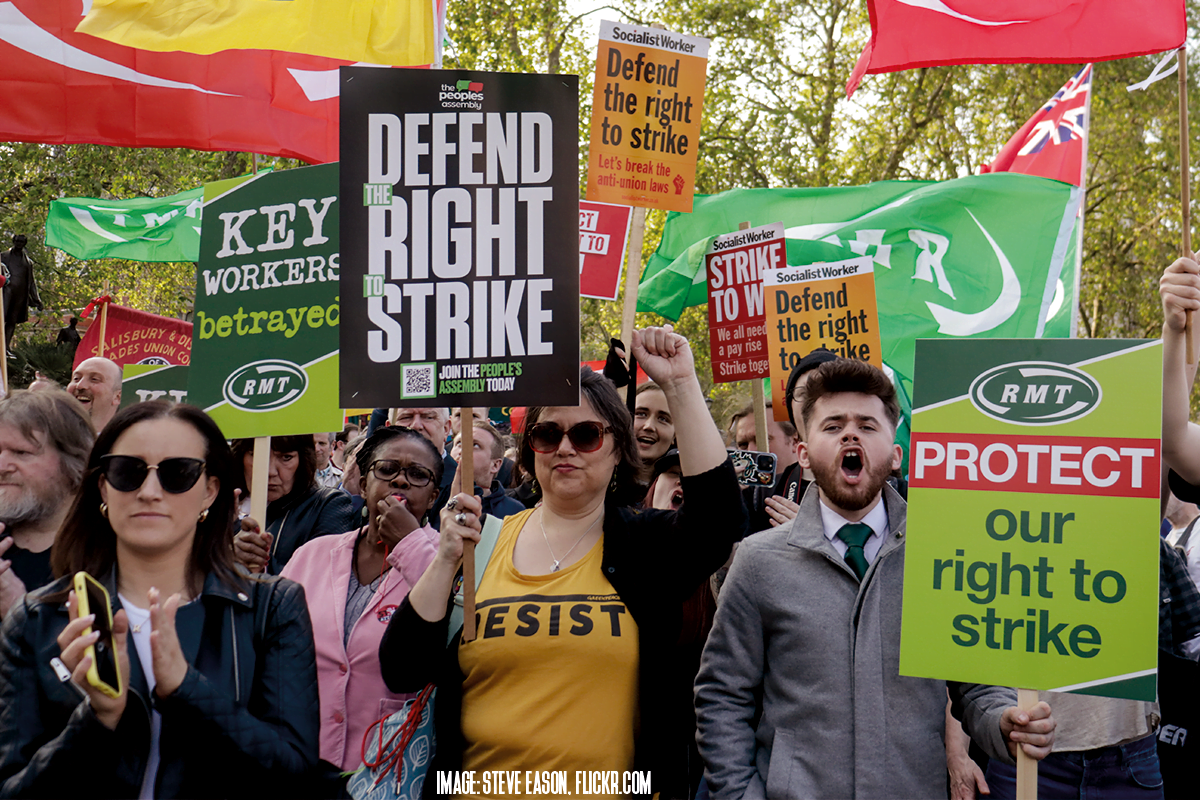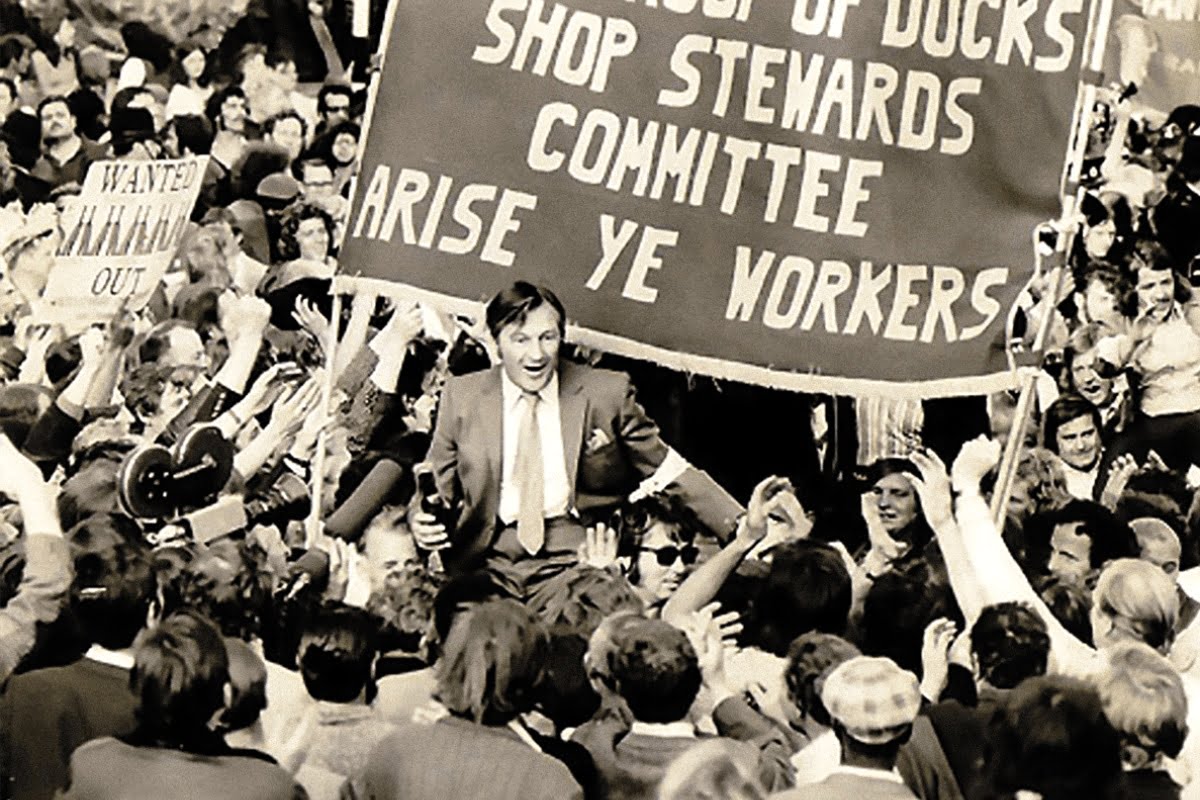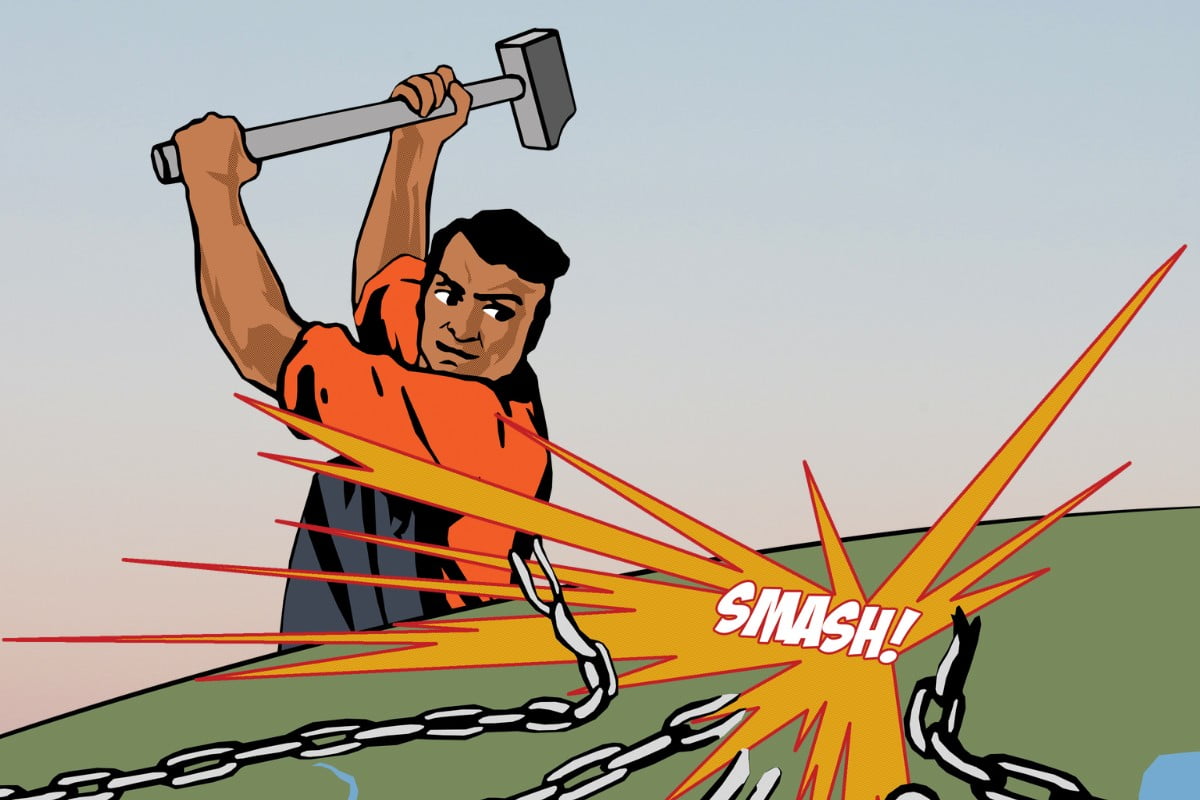The gauntlet has been thrown down. Having passed the Minimum Service Levels bill into law, the Tory government and its capitalist backers will now try to use this new weapon to suppress strikes in key sectors.
From health to transport; schools to emergency services: the scale of this legislation is scandalous. All of the unions in these sectors risk being forced to scab on their own disputes, at the behest of employers who will determine what legal minimum such services should operate at.
Short of actually banning the right to strike altogether, it’s hard to imagine a more reactionary set of laws. In some areas, it may mean that legal strike action is no longer possible at all.
It is extremely telling that the sectors being targeted have all seen mass strikes over the past year, with workers moving into action in the face of the cost-of-living crisis, and after years of austerity and attacks.
The Tories and bosses are clearly scared by this reawakening of the working class. That is the real reason behind these new anti-union laws. They don’t want workers to realise the potential power they have, and are resorting to repression to try and stop our class from fighting back.
Speaking recently, FBU general secretary Matt Wrack stated that “mass non-compliance” was one of the options being considered by the trade unions. Other union leaders have made similar noises.

The trade union movement must mobilise, organise, and prepare to meet this challenge head on. Mass non-compliance must mean nothing less than coordinated, hard-hitting action, in defiance of any attempts to force striking union members back to work.
This is the fighting strategy – a mass campaign of action – that TUC leaders should launch when they meet on 9 December to discuss their response to these latest Tory attacks.
In the case of the Pentonville Five in 1972, a huge militant movement successfully overturned efforts to victimise striking dock workers. Further strikes by the miners and others then went on to topple the Tory government of the time.
A similar movement is possible today. But instead of backing down at the eleventh hour, as union leaders eventually did in the ‘70s, what is needed is a leadership prepared to go all the way.
The communists are fighting as part of this movement: not only to smash the bosses’ laws, but to topple the rotten government that passed them – and to overthrow the profit system that they are designed to protect. Join us in this task!
How to defy the bosses’ laws: Lessons from past struggles
Sean Hodges
Over the decades, the Tories have pushed forward many draconian anti-union laws on behalf of the bosses. Their latest effort is the so-called Strikes (Minimum Service Levels) Act 2023.
This reactionary piece of legislation is an attempt to severely curtail the ability of certain unions to strike. It has provoked intense anger amongst those affected, particularly rank-and-file union members.
Trade union leaders in every industry have lined up to denounce the bill. Some have even gone on record as supporting a strategy of ‘non-compliance’ in response to any attempts by employers to actually utilise this law.
The history of the British trade union movement provides valuable lessons in countering such attacks. We must look to these episodes in order to point the way forward for workers today.
Warrington dispute
One negative example can be found in the Warrington dispute.
In December 1983, the National Graphical Association (NGA) launched a struggle against the Stockport Messenger. The paper’s owners wanted to smash the ‘closed-shop’ system. This allowed the unions to have a considerable say over hiring and firing inside workplaces. And the NGA was prepared to resist the bosses over this question.
The Tories, in preparation for a wider assault on the working class, backed the employers fully. Thatcher’s government even went so far as to sequester the union’s assets through the courts – a tactic they would later deploy during the Great Miners’ Strike.
These repressive actions clearly aimed to set a precedent for future showdowns. But when the NGA asked the TUC for help, its response was to dither. At the behest of the movement’s right wing, TUC leaders even repudiated an earlier decision to back the print workers.
The result was a defeat, leading to the destruction of jobs, pay, and conditions for workers across the whole industry.
Pentonville
These events echoed the earlier dispute of the Amalgamated Union of Engineering Workers (AUEW) in 1972. In this, the leaders restrained themselves to verbal protests when the courts issued fines against the union for expelling a scab. This battle also ended in defeat for the workers.
The employers recognised that, under its conservative leadership of the time, the union would not seriously back the unofficial strike action that the fine had triggered.
By contrast, the Pentonville struggle that took place in the same year shows how the bosses’ laws can be reduced to a dead letter.
While the TUC tops hesitated, the movement of the rank and file pushed the struggle forward – especially after the arrest of five dock workers.

This immediately provoked an almighty movement that spread across many sectors. Eventually, the TUC was forced to call for a one-day general strike.
The Tories and bosses were faced with a mass upsurge of action, involving hundreds of thousands of workers across several industries, much of it unofficial. And they rightly feared that the TUC’s proposed day of action could develop into an all-out general strike. This terrified the government into backing down.
Unity in action
The immediate lessons are clear. The establishment, the state, and the capitalists they protect are not impressed by ‘moderation’ and ‘reasonableness’ from the union leaders. What is needed is a display of strength by the organised working class.
There are countless examples throughout the history of the labour movement that demonstrate this point. When the leaders prevaricate, or confine themselves to purely ‘legal’ action, the battle is essentially lost before it has even begun.
Calls for ‘non-compliance’ with minimum service legislation are therefore clearly on the right track. But the example of Pentonville shows that such defiance has to be backed up with wide-ranging and hard-hitting action.
Moreover, such action must be coordinated between unions, to prevent strikers being isolated and picked off. A huge, cross-union movement can overturn any law, defeat any injunction, and deal a heavy blow against the government that stands behind these attacks.
What is needed is militant leadership, prepared to put this fighting strategy into practice and go the whole way. We need leaders who are willing to mobilise workers around bold socialist demands, in order to genuinely tackle the problems they face.
The fight against the Minimum Service Levels Act will be a key component of the intensifying class war in the period ahead.
The bosses and Tories are fearful of the reawakening workers’ movement, and are looking to augment their repressive arsenal in preparation for the battles to come. The unions must organise, mobilise, and confront them head on.
Tories impose minimum service levels on teachers: Fight to defend education!
Oliver Atack, York NEU (personal capacity)
The government recently announced plans to introduce minimum service levels for schools to ‘protect children from strike action’.
Education workers, students, and parents all understand that schools already function below ‘minimum service levels’, however. Many schools are literally crumbling!

A mental health epidemic and other such issues plague students like never before, meanwhile, with schools unable to address them due to years of budget cuts.
That is why resisting these curbs on our right to strike is so important. If workers can’t defend the education sector, then who will?
It’s up to all workers to stand up and oppose these attacks. Concretely, this means the TUC preparing now to organise serious cross-union action.
Education unions must also pledge to defend any member or branch that refuses to comply with the employers’ orders and scab during a dispute.
This legislation proves that the Tories are afraid of the potential power of the organised working class. Above all, they want to turn parents and students against teachers. They will not succeed.
With the right methods, workers and young people can smash these anti-union laws, bring down the rotten government that is pushing them, and overturn the decrepit system that they defend!






